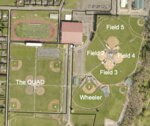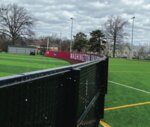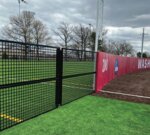


With baseball and softball seasons quickly approaching, the Centralia City Council on Tuesday selected which fields will get artificial turf first at Fort Borst Park to improve playing conditions.
Players have been asking for turf because the fields are often unusable due to the weather, forcing teams to go elsewhere to play.
Many past and present players on the Centralia High School (CHS) girls’ fastpitch softball team have also advocated for a dedicated fastpitch field, as no field at Borst Park is regulation size.
Deputy City Manager and Parks Director Amy Buckler presented the council with three different turfing options to choose from on Tuesday, all of which included turfing the infield and installing a permanent turf pitching mound for baseball players on Wheeler Field.
The three options differed in which of the four other Borst Park fields would be turfed for softball players, along with either installing a permanent fence on the field to designate it for only softball or installing a semi-permanent fence, which the Twin Cities Sports Commission offered to pay $60,000 to purchase and set up.
“We believe that by installing semi-permanent fences, we can expand the field size as needed after the CHS girls' softball season, which will allow Centralia to continue offering co-ed softball on this field, as well as add middle school baseball,” Twin Cities Sports Commission President Chris Moore said in a letter to the council. “This flexibility will undoubtedly bring significant economic value to our community.”
Ultimately, the council voted unanimously to approve option C, which proposed installation of artificial turf and a semi-permanent fence in Field 2 at Fort Borst Park. The fence will remain installed during the Centralia High School girls fastpitch softball season to leave a field designated for the team.
According to Buckler, the artificial turf is expected to last between eight and 10 years before needing to be replaced.
The council voted to allocate $1,424,087 of the city’s American Rescue Plan Act (ARPA) funds to turf these fields last year.
In addition to the ARPA funds, approximately $3.13 million is also available to turf the park’s fields, including a Department of Commerce grant, Centralia Public Facilities Districts funds and both TransAlta and Twin Cities Sports Commission funding, according to the council’s agenda report.
“From my perspective as the parks director, I think (option C) is the best option,” Buckler said. “... If the Sports Commission is willing to pay that $60,000 for that super nice fence, I’d be OK with accepting that.”
The semi-permanent fence would allow for multiple sports, including fastpitch, to be played on the field.
“We can do that and see how it works to take the fence down for other opportunities,” Buckler added.
The approved proposal gives the parks department time to see how the field will be used over the next few years to determine if a permanent fence should be installed instead.
The other two options presented included option A, which proposed turning Field 2 into a permanent fastpitch field with a permanent fence and turf, and option B, which proposed turfing Field 3 and installing a semi-permanent fence on that field.
Many of the girls softball teams already play on Field 3 for access to a scoreboard and public address system. If Field 2 is turfed, the scoreboard and public address system would need to be moved.
Centralia High School senior Lauren Wasson, who also serves as the student representative for the Centralia Parks Board, wrote a letter of support for option A.
“I have played fastpitch going on 12 years this next season, and without a doubt there has been a lack of equality and resources for fast-pitch players,” Wasson said.
She added there are a total of 11 fields at Fort Borst Park, and not a single one is regulation size for women’s softball. This has led to her and her teammates being forced to play home games at fields in other communities.
“It would not only serve the high school fastpitch team, but the young girls and boys in the community, rec and select teams year-round would reap the benefits,” Wasson said.
Councilor Max Westley questioned why the Centralia School District wasn’t planning on turfing and designating one of the four fields in the quad, which is directly adjacent to the park.
Buckler said it had been discussed with school district staff and they weren’t opposed to the idea, but in their opinion, it made more sense to keep the quad intact for baseball since the fields are bigger.
“We felt that, from a system-wide perspective, it was better suited over in Borst Park,” Buckler said.
As for the possibility of having to move the scoreboard and public address system from Field 3 to Field 2, Deputy Mayor Cameron McGee said he felt it would not be an issue.
“It leaves us the most options for the future,” he added.
Mayor Kelly Smith Johnston said it was “high time” girls had their own dedicated field to call home.
“That said, I’m extremely grateful for the Twin Cities Sports Commission for coming up with an alternative and for offering to help pay for it,” Smith Johnston said. “… I would support any of the options, if option B or C included, in writing, that the (semi-permanent) fence would stay up and that field would be dedicated throughout the high school girls sports season, and, secondly, that field would be prioritized for use fastpitch use over baseball.”
Buckler confirmed their intent was to ensure that the field, even with a semi-permanent fence, would be dedicated for fastpitch during the CHS softball season.